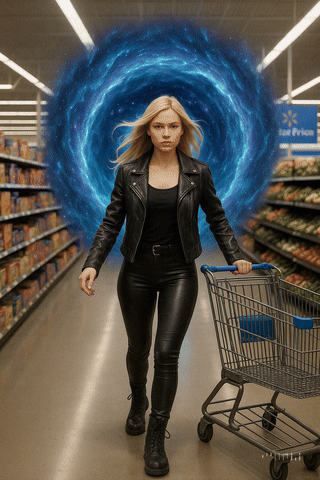Impulse Unraveled continues its slow descent into chaos with “The Eagle and the Bee,” an episode that tries to pass off confusion as complexity. It juggles teleporters, angels, religious guilt, drug deaths, and domestic dysfunction, but drops most of them on the floor.

Henry teleports into a Walmart to do a little shopping after hours.
Let’s start with the bizarre logic: teleporters apparently use cars now. Even angels, who aren’t human, still eat like the rest of us. There’s a disconnect here—why teleport when you can drive? Why do divine beings need breakfast? The show seems to forget its own rules.
Henry, our troubled protagonist, teleports into her childhood home, now occupied by strangers. It’s no longer hers—time has erased her claim. She’s caught by the new disabled owner, who pulls a gun. Henry flees, only to come back again. Why? Maybe trauma needs repetition to be real.
Meanwhile, the Mennonites tremble at the modern world. They see evil in drugs and cities, yet Amos, one of their own, was killed by fentanyl—handed to him by his own religious circle. Hypocrisy doesn’t need subtitles here.
Cleo, Henry’s mother, is unraveling too. She’s looking for a job for the first time in years while being financially supported by her Catholic boyfriend. The irony? She’s uncomfortable with his help, even though tradition would tell her it’s her “place” to be dependent. The show pokes at gender roles and faith but doesn’t dig deep—just enough to make everyone uncomfortable.
The homeowner who catches Henry is the emotional core of the episode. She’s disabled and forgotten. Her daughter couldn’t care less—didn’t even flinch when told her mother had cancer. This character sees old age as a punishment, parenting as thankless, and memories as a cruel joke.
Lucas—let’s not forget—committed murder. He killed Amos in revenge for what happened to his brother. It’s Biblical, but without the forgiveness. He’s no Joseph, just a man with blood on his hands and nothing to show for it.
Eventually, Henry is kicked out. The house has moved on, even if she hasn’t. Her past is a ghost that no longer fits the walls.
And finally, Clear Tech Corp. They don’t just track teleporters—they own them. Like cattle tagged by gravity. These people are dying in labs, and no one seems to care. The series hints at exploitation but doesn’t bother with outrage—it just shrugs.
This episode isn’t just dark. It’s bleak. Not in a profound way, but in a “nothing matters and no one’s paying attention” kind of way. And maybe that’s the point.